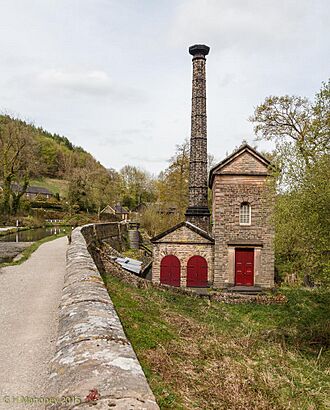Leawood Pump House facts for kids
Quick facts for kids Leawood Pump House |
|
|---|---|
 |
|
| General information | |
| Town or city | Cromford |
| Country | England |
| Coordinates | 53°05′51″N 1°31′51″W / 53.09750°N 1.53083°W |
| Ordnance Survey | SK3152855682 |
| Designations | Grade II |
The Leawood Pump House is a special old building near Cromford, Derbyshire, England. It was built in 1849. Its main job was to pump water into the Cromford Canal. This canal was built about 50 years before the pump house. The Leawood Pump House is a very important historic building. It is listed as a Grade II* building. This means it is a particularly important building of more than special interest.
Contents
What is the Leawood Pump House?
The Leawood Pump House is also known as the High Peak Pump House. It stands tall at about 45 feet (13.7 meters) next to the River Derwent. You can find it along the canal towpath from High Peak Junction. It has a tall chimney stack, about 95 feet (29 meters) high. The top of the chimney has a cast-iron cap.
Why Was It Built?
The Cromford Canal needed a lot of water to work properly. Boats used to travel along the canal. Each time a boat went through a lock, water was lost. The Leawood Pump House was built to keep the canal full of water. It made sure there was always enough water for the boats.
How the Pump House Works
The pump house uses a powerful steam engine to move water. This engine is called a Watt-type beam engine. It was designed by Graham and Company. They built it in Elsecar, Sheffield.
The Giant Engine
The engine has a huge beam that is 33 feet (10 meters) long. Its piston is 50 inches (1.27 meters) across. The piston moves 10 feet (3 meters) with each stroke. The engine works slowly but powerfully. It makes about seven strokes every minute. The boilers that power the engine were replaced in 1900. They create steam at a pressure of 40 pounds per square inch (psi).
Pumping Water
Water for the canal is taken from the River Derwent. It flows through a 150-yard (137-meter) long tunnel. This tunnel leads to a reservoir in the pump house basement. From there, the engine lifts the water 30 feet (9 meters) high. Then, it releases the water into the canal.
Pumping Power
This pump is incredibly strong. It can move almost four tons of water with just one stroke. Since it makes seven strokes a minute, it can pump over 39,000 tons of water in 24 hours! This huge amount of pumping was needed because of special rules. The pump was only allowed to take water from the River Derwent for a limited time. This was only between 8 p.m. on Saturdays and 8 p.m. on Sundays. So, it had to pump a lot of water very quickly during that time.
History of the Leawood Pump House
The Leawood Pump House worked without stopping from 1849 until 1944. It stopped working when the Cromford Canal closed down.
Restoration and Today
In 1979, the Cromford Canal Society restored the pump house. They brought it back to life! Today, the Leawood Pump House is run sometimes. Visitors can see this amazing piece of history in action. It shows how people used steam power to move water long ago.

